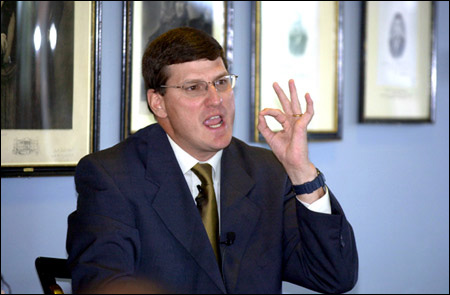Ritter: Iraqi arms ‘gone’ as of ’98:
Former weapons inspector fields questions at KSG

Former U.N. weapons inspector Scott Ritter said he would be willing to fight and die in a war against Iraq, as long as the United States played by international rules and attacked only after a fair inspection process revealed Baghdad had resumed production of biological, chemical, or nuclear weapons.
“If inspectors find biological, chemical, nuclear weapons, we have every right to treat Iraq as a pariah nation, Saddam Hussein as a rogue leader,” Ritter said during a stop at the Kennedy School of Government. “If he has weapons today, I believe Saddam Hussein presents a clear and present danger and should be dealt with harshly.”
Ritter, who worked as a chief United Nations weapons inspector in Iraq from 1991 to 1998, has written a book and filmed a documentary on the problem of Iraqi arms. He has emerged as a chief critic of the Bush administration’s Iraq policy and of its calls for the ouster of Iraqi leader Saddam Hussein.
Ritter said the current U.S. policy does not play fair with Iraq. Setting a policy of regime change before seeing the result of renewed U.N. inspections taints the process. Calling the previous inspection process a “corrupt police force” because of undue U.S. influence, he urged the new inspectors to do their jobs as fairly and professionally as possible.
He appeared Wednesday (Sept. 25) at a brown bag lunch held in the School’s Malkin Penthouse and sponsored by the Institute of Politics (IOP) and the Belfer Center for Science and International Affairs.
IOP director Dan Glickman briefly introduced Ritter to the crowd of about 150. After an opening statement in which Ritter urged the audience to form their own thoughts on the Iraqi question, Glickman opened a question-and-answer session that dominated the hourlong event.
Despite acknowledging that Iraqis lied to and obstructed weapons inspectors before they were pulled out of Iraq in 1998, Ritter said the inspectors did a good job of ensuring Iraq’s weapons capabilities were destroyed.
“As of December 1998 when weapons inspectors left Iraq, we had fundamentally disarmed Iraq,” Ritter said. “We conducted the most intrusive, on-site arms inspection regime in the history of disarmament.”
Though Iraq could have re-established its weapons programs in as little as six months, Ritter said there is no evidence that they have. Absent such evidence, the United States is ill-advised to go to war unless an impartial weapons inspection program confirms their presence.
“I think it’s irresponsible to assume Iraq does have those [weapons of mass destruction]. I think it’s irresponsible to assume Iraq does not have them,” Ritter said. “We have to get in and inspect.”
Ritter also said he doubted the existence of any links between Iraq and the Al Qaeda terrorist network, saying that Iraqi intelligence documents show that Hussein considers Muslim fundamentalism a threat.
When asked whether he would return to Iraq as a weapons inspector, he said his recent high profile makes him a bad candidate. Besides, he said, during his seven years in Iraq, he missed his children learning to crawl, walk, and talk.
“No, I’m not going to be a weapons inspector,” Ritter said. “I’ve served my time.”




